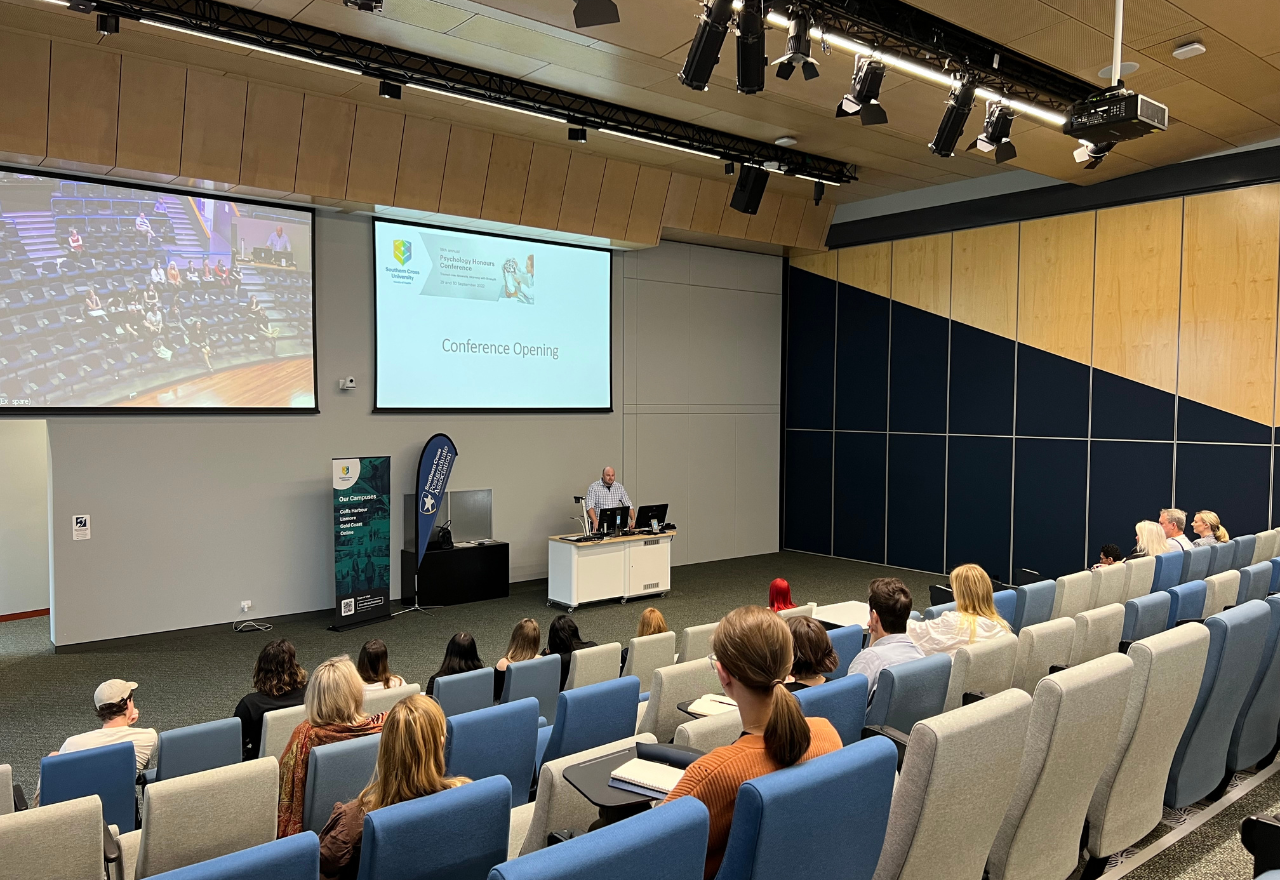Psychology students explore nature, climate and mental health at 21st annual Honours Conference
23 September 2025, 12:00 AM
 The Psychology Conference at the Gold Coast 2022. Photo: supplied
The Psychology Conference at the Gold Coast 2022. Photo: suppliedHow can nature, adventure and climate shape our mental wellbeing? Can simple online practices build resilience in a time of global pressures? These are some of the questions being explored by Southern Cross University Psychology Honours students at the 21st annual Honours Conference on Thursday 25 and Friday 26 September at the Gold Coast campus and online.
The student-led research spans topics with direct community impact, from how outdoor adventure and nature connection enhance wellbeing, to the effects of climate change on our relationship with the natural world, through to positive psychology strategies for boosting resilience.
Now in its 21st year, the Psychology Honours Conference has grown from a modest gathering of a few dozen students into a showcase of ideas and innovation, with 105 students presenting in 2025.
The conference is designed to connect students with the wider community while celebrating the culmination of their Honours year, a challenging and transformative experience that sees each student design and carry out their own research project for the first time.
Psychology Honours Co-ordinator, Dr Eric Brymer, said the event is a highlight of the academic calendar and a valuable launchpad for emerging scholars.
“We have an enormous range of high-quality projects being presented and, importantly, opportunities to ask questions from all researchers,” he said.
“The Honours conference offers an opportunity to celebrate the students’ hard work and intellectual growth, network, present their own unique research, gain exposure to their peers’ cutting-edge scholarship, develop valuable communication skills, and enhance their professional identity and future career prospects.”
One key theme among the research topics is the health and wellbeing benefits of nature-based experiences.
Student Emily Clark’s research investigates how physical activity, adventure behaviour-seeking, and connection to nature (nature-relatedness) influence mental wellbeing.
Emily’s research looks beyond the question of ‘how much exercise is enough’ to how seeking out adventure and a connection to nature might enhance the psychological benefits of being active.
Using an online survey to capture the experiences of 583 Australian adults, Emily’s research looks at the relationships between activity levels, adventure, connection to nature, and mental wellbeing. Her results showed that while moderate and high levels of physical activity improved wellbeing compared to low activity, the benefits plateaued, once they reached a level beyond moderate, rather than continuing to increase. Engaging in adventurous activities added unique benefits to mental health outcomes beyond physical activity, and people who engaged in adventurous activities often reported feeling more connected to nature, which boosted their wellbeing.
“I chose this topic to shift the conversation beyond structured interventions and standard physical activity guidelines. This research aims to inform more accessible, preventative public health approaches to support mental wellbeing at scale,” Emily said.
Psychology Honours student Georgia Coleman is investigating how climate change is reshaping people’s relationship with nature and what that means for mental wellbeing.
Her research uses in-depth interviews to explore lived experiences, focusing on how climate anxiety influences the restorative effects of time spent outdoors.
Georgia’s findings suggest that while participants sometimes experienced fleeting negative thoughts about climate change when in nature, these moments did not override the deeper sense of restoration, freedom and connection the natural world provides.
“I hope this research can inform therapeutic interventions and wellbeing initiatives for climate anxiety and build towards theoretical frameworks, for the human-nature-wellbeing relationship, that account for climate change,” Georgia said.
Coffs Harbour student Jane Hosking is examining the lived experiences of older adults with nature and how it supports mental wellbeing.
Inspired by her love of the outdoors and her mother’s generation, Jane aims to understand how time in natural settings contributes to health and quality of life for older Australians.
Using semi-structured interviews with 15 participants, Jane applied a Hermeneutic Phenomenology approach, which treats participants as co-researchers to explore the depth of their experiences. Her thematic analysis uncovered five key themes: transcendence, a sense of belonging, humility, inner peace, and immersive embodiment, all of which highlight the meaningful ways older adults experience and benefit from time in nature.
Jane hopes her research will have a practical impact on health practices. “I’m hoping this research will help inform medical practitioners about the wellbeing benefits of time spent in nature for Australia’s older adults,” she said.
Kamala Mansfield is exploring a different area of interest, focusing on positive psychology and how savouring-focused online interventions can help build resilience.
Her research aims to find accessible, low-cost strategies that support mental wellbeing, particularly in the current global climate where pressures and mental health concerns are increasing.
As part of a larger study led by Associate Professor of Psychology Desirée Kozlowski, Kamala examined the effects of a live online psychoeducation workshop focused on the practice of savouring. Participants first completed two surveys to measure their resilience, pleasure and savouring skills, then took part in the workshop where they learned about the science of pleasure and practiced savouring to enhance their positive experiences. A follow-up survey four weeks later measured any changes in resilience, pleasure and savouring.
Kamala said her research could have practical applications for mental health support. “I think this research has important implications for building accessible, low-cost and scalable interventions that can help improve people’s access to mental health support and tools to improve their resilience and wellbeing,” she said.
The program for the Psychology Honours Conference is available to view here and can be streamed online on 25-26 September, the link will be available to those who have registered to attend.

